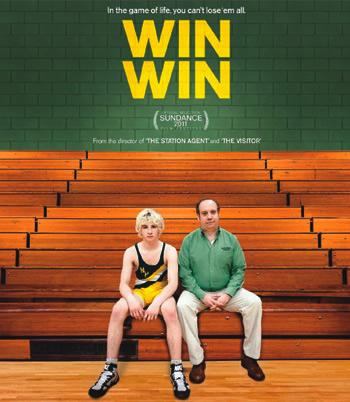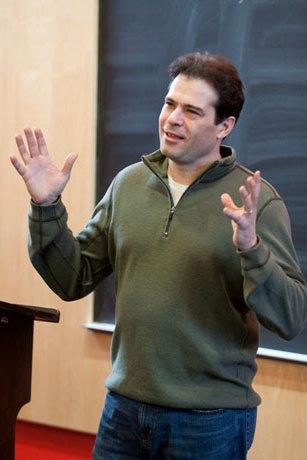Dickinson College
Going To The Mat

Attorney Joe Tiboni '88 Grapples With A Sideline In Screenwriting
by Sherri Kimmel

Joe Tiboni ’88 is antsy. It’s as if he has a horse running in the Kentucky Derby, and he’s watching it take its last warm-up trot on the track before nervously jigging into the starting gate. But Tiboni is no Kentucky colonel with a horse in the race. He’s a modest New Jersey elder-law attorney whose firm is lodged in a taupe-frame, 100-year-old house.
Still, he does have something that’s setting his teeth on edge, and it’s as much of a long shot as owning a prospective Derby winner. Win Win, a feature film that he co-wrote—and which is modeled on his seemingly simple small-town life—premiered at Park City, Utah’s Sundance Film Festival in late January and debuted in theatres nationwide on March 18.
Will Win Win be his sundown, Tiboni wonders? Or will it be the sunrise of his unlikely avocation: feature-film scriptwriter?
Though he’s an attorney by trade, Tiboni has been fired up about writing since his junior year at Dickinson’s Bologna, Italy, program. The late Robert Nilsson, political-science professor and founder of Dickinson inaugural study-abroad program, was Tiboni’s site director. Nilsson was so impressed by Tiboni’s required journal entries that he encouraged the political-science major to keep writing. Tiboni did so in solitude, until about four years ago, when he contacted a New Providence High School friend, Tom McCarthy, a writer and director of small movies with a lot of heart—The Station Agent (2003) and The Visitor (2008). McCarthy also co-wrote the Oscar-nominated Up script and has acted in many films, most recently Little Fockers, as well HBO’s The Wire.
“I’m always writing scenes, and I e-mailed Tommy a scene,” Tiboni explains. “A week later, he said, ‘I really like that. We should do something together.’ He called me up three months later, and said, ‘I have this idea about wrestling.’ ”
That wrestling should figure in the mix is no surprise. Though they met in grade school as bench warmers for the basketball team, the friends went on to share the indignities of appearing publicly in skin-tight singlets.
“Wrestling was our joint experience in high school,” says Tiboni. “Now we’ve finally made something traumatic into something dramatic.”
Not only does their wrestling background inform the story, but the main character, an elder-law attorney named Mike Flaherty, is modeled on Tiboni. Though shot on Long Island rather than in New Providence, because of New York’s more favorable tax climate, the movie replicates Tiboni’s surroundings—from his office to his century-old colonial-style house. Like Tiboni, Flaherty has two children, but he has a stay-at-home wife. Jane Tiboni, who Joe met in law school, co-owns their firm.
Though Mike’s life mimics Joe’s, the ethical dilemma at the crux of the story is not one that Tiboni has experienced, nor is his law firm failing the way Mike’s is. Mike, who also coaches high-school wrestling, agrees to be the legal guardian of an elderly man, hoping the fee for service will keep him afloat. Instead of moving the man into his own home, as promised, Mike sticks him in a nursing home. Mike is thrown for a loop when his client’s runaway teenage grandson, a talented wrestler, arrives on his doorstep.
Through two years of writing and revising side by side, via e-mail and conference call, Tiboni and McCarthy developed the script, with the help of a third writer, Jacqueline Brogan. It eventually became a 120-page screenplay for a movie that cost an economical $10 million.
Key to its unlikely progress from idea to feature film was the casting. McCarthy had attended Yale with Paul Giamatti and used that connection to get the script in front of the Golden Globe-winning actor whose breakout role was in Sideways.
“It’s cool to see the thing you thought up with a friend come together, then the next thing you know, he’s saying, ‘Let’s get a really good actor.’ When he got Paul Giamatti I was so psyched.” Win Win’s other noteworthy actors include the Oscar-nominated Amy Ryan and Bobby Cannavale.
As McCarthy had promised, Tiboni was able to witness every stage of movie production, including the filming, last March to May. “I was able to see the words come to life and see the actors’ input and Tom’s input as director,” he says.
Though he saw early rough versions, Tiboni didn’t opt to preview the fully assembled product before the Sundance premiere. “I said to Jane that I want to be like everyone else and see how people react.”
Fortunately, he wasn’t disappointed. “The film was well received and, directly after the premiere, I was able to go on stage with the cast and answer questions about the making of the screenplay. The audiences seemed to really enjoy the movie, and the critics have been very positive.”
He’s also pleased that on first viewing, the audience understood the writers’ intention. “We wanted to make a movie with comedy and heart that people would enjoy and maybe would get them thinking—especially about the treatment of the elderly in our society,” says Tiboni. “I think from the reaction they did and that makes me really happy.”
As he tensely awaits the movie’s reception by general audiences and critics this spring, Tiboni asserts that his ambition to write more scripts remains undaunted. “People asked how we did it. I have no idea—we just did it. It was kind of a herculean task. I enjoyed doing it and would do it again in a minute.”
Published April 1, 2011